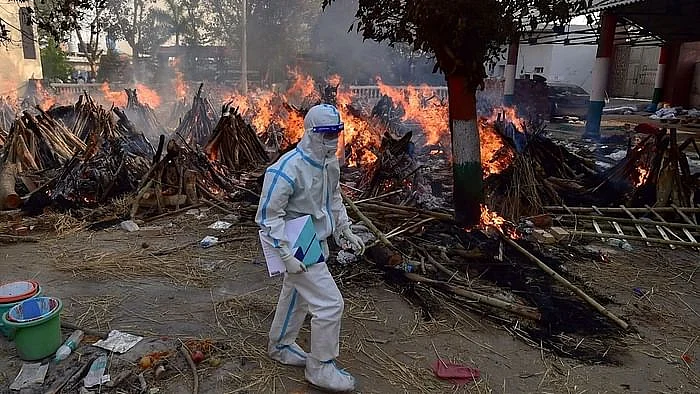The Supreme Court, on Tuesday, 25 May, stayed an Allahabad High Court order, which had held that apprehension of death due to COVID-19 can be a ground for grant of anticipatory bail.
Hearing the Uttar Pradesh (UP) Government’s appeal against the order, a vacation Bench of Justices Vineet Saran and BR Gavai said that this Allahabad High Court judgment cannot be cited as as a precedent to grant anticipatory bail and that the other courts should not rely on the observations made by the Allahabad High Court in this case.
The ruling had come in an anticipatory bail application before the High Court, filed by one Prateek Jain, who was charged under Sections 420, 467, 468, 471, 506, and 406 of the Indian Penal Code.
Further, the court appointed Senior Advocate V Giri as an amicus curiae to help with the larger issue on whether COVID should be a ground for anticipatory bail.
MORE DETAILS
While the top court stayed the observations made by the High Court, it did not stay the bail granted by the Allahabad High Court to the individual accused in the case.
“As far as observations are concerned it remains stayed and courts shall not consider the said directions (of the High Court) while granting anticipatory bail and must consider merits of each case while deciding the same.”Supreme Court
WHAT WERE THE UP GOVERNMENT'S CLAIMS?
The Uttar Pradesh Government had claimed before the Supreme Court that:
- The High Court implies that administration of criminal justice "shall be kept in abeyance during the ongoing pandemic" and the "offenders shall enjoy a free hand while committing crimes with impunity during the ongoing pandemic, which is not likely to end in the near future".
- “Grant of anticipatory bail to the accused on the ground of his right to life and personal liberty has patently bent the scale of excessive rights towards the accused while overlooking the collective rights of the victims who seek justice for the wrongs committed by such accused persons".
WHAT HAD THE HIGH COURT SAID?
Granting anticipatory bail to Prateek Jain, the Allahabad High Court had said: “The law is a dynamic concept and it is required to be interpreted as per the requirements of time and with the change in the requirements of time, the interpretation and application of law is required to be adopted with change.”
“If an accused dies on account of the reasons beyond his control when he could have been protected from death by the court, the grant or refusal of anticipatory bail to him would be an exercise in futility. Hence, the apprehension of death on account of reasons like the present pandemic of coronavirus can certainly be held to be a ground to grant anticipatory bail to an accused.”Allahabad High Court
Highlighting that there is no proper testing or treatment of persons confined in jails, the court also observed that there were several ways in which an arrested person could contract the virus, including from jail inmates, the police, and court personnel.
“The fundamental right to life unconditionally embraces even an undertrial,” the High Court had said and had gone on to refer to the Supreme Court’s own order permitting ailing journalist Siddique Kappan to be transferred to AIIMS.
Further, in the same order, the High Court had observed that the Election Commission, the higher courts, and the government “failed to fathom the disastrous consequences of permitting the elections in few states and the Panchayat elections in the state of Uttar Pradesh”.
(At The Quint, we question everything. Play an active role in shaping our journalism by becoming a member today.)
